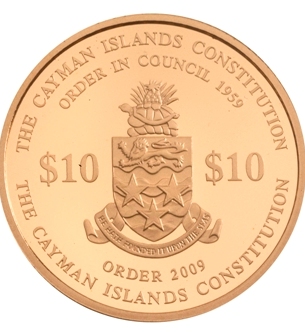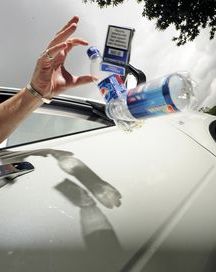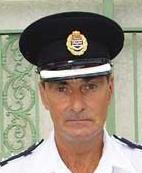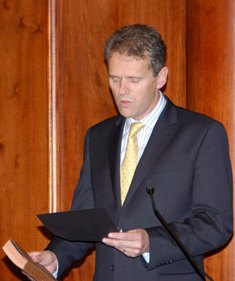Archive for January, 2010

Police charge man with rape
Police said that enquiries conducted by local CID officers resulted in the arrest of Ebanks, who has now been formally charged with the rape of the male victim and will now make his first appearance in Summary Court later today. Anyone with information about crime taking place in the Cayman Islands should contact their local police station or call Crime Stoppers on 800-8477 (TIPS).

Brac PWD gets new equipment
 (CNS): Equipment and vehicles valued at approximately US$375,000 have been purchased for the Sister Islands’ Public Works Department (PWD) to replace models no longer feasible for repair. The purchases include a Caterpillar wheel loader, motor grader; vibratory roller and a 16-seater Hiace van. According to Minister responsible for District Administration and Works Juliana O’Connor-Connolly, the heavy equipment will be used for on-going road maintenance and works projects, and is also critical to any future hurricane relief and recovery effort.
(CNS): Equipment and vehicles valued at approximately US$375,000 have been purchased for the Sister Islands’ Public Works Department (PWD) to replace models no longer feasible for repair. The purchases include a Caterpillar wheel loader, motor grader; vibratory roller and a 16-seater Hiace van. According to Minister responsible for District Administration and Works Juliana O’Connor-Connolly, the heavy equipment will be used for on-going road maintenance and works projects, and is also critical to any future hurricane relief and recovery effort.
The minister and Department of Vehicle and Equipment Services (DVES) Director Dale Dacres presented the items to PWD personnel in Cayman Brac and Little Cayman on Thursday 7 January.

New government jobs created to support commissions
 (CNS): Following the creation of several new commissions to meet the requirements of the new Constitution, government has also created a new team of civil servants to support them. Deborah Bodden, formerly secretary to the parole and prison boards, will head the new department following her appointment by Franz Manderson, the chief officer of the Portfolio of Internal and External Affairs, to be the Manager of the Commissions Secretariat. According to GIS, this secretariat will provide administrative support to the new constitutional commissions.
(CNS): Following the creation of several new commissions to meet the requirements of the new Constitution, government has also created a new team of civil servants to support them. Deborah Bodden, formerly secretary to the parole and prison boards, will head the new department following her appointment by Franz Manderson, the chief officer of the Portfolio of Internal and External Affairs, to be the Manager of the Commissions Secretariat. According to GIS, this secretariat will provide administrative support to the new constitutional commissions.
These are the Human Rights Commission, the Constitutional Commission, Commission for Standards in Public Life, and it will also support the Judicial and Legal Services Commission. Government officials said these commissions will require various forms of administrative assistance as well as a “strong research capacity” to fulfil the constitutional responsibilities.
The manager leads a team that will include four administrator/analysts, who will focus on providing the research and administrative support required by the four commissions. Established under the Deputy Governor’s Office, the Commissions Secretariat will deploy a “joint services” approach to those it serves in order to minimise costs in the current fiscal climate,” government said.
Bodden said she was looking forward to working with all four commissions and their chairs. “I am excited to be part of what is a new chapter for Cayman,” she added.
Talking about the appointment, Manderson said Bodden was selected from a strong field of candidates. He said she had shown exemplary skill on her work with the prison and parole boards, both of which have undergone significant changes. “She will be able to draw from this administrative experience as she leads the Commissions Secretariat team in the support it provides to four brand new commissions,” Manderson said. “I am delighted with this appointment, and I will be following with interest the ways in which the new commissions, with the support of the Commissions Secretariat, will contribute to the democratic strength and vigour of our nation”.
Deputy Governor Donovan Ebanks recently announced 13 appointments to the Constitutional Commission, the Human Rights Commission, and the Commission for Standards in Public Life. Appointments to the Judicial and Legal Services Commission will be made within the next two to three months, GIS stated, but gave no reason for the delay in these appointments.

Brackers told to stop littering
 (CNS): Warning drivers on Cayman Brac to look out for clean up crews working around the Island, Chief Inspector Malcolm Kay said there would be no need for them if people would stop throwing litter from their cars. As the roadside clean up resumes on Cayman Brac, Kay urged motorists to take extra care on the roads and to slow down when they approach the clean up crews. “Please heed your speed when you approach the crews,” Chief Inspector Kay said.
(CNS): Warning drivers on Cayman Brac to look out for clean up crews working around the Island, Chief Inspector Malcolm Kay said there would be no need for them if people would stop throwing litter from their cars. As the roadside clean up resumes on Cayman Brac, Kay urged motorists to take extra care on the roads and to slow down when they approach the clean up crews. “Please heed your speed when you approach the crews,” Chief Inspector Kay said.
All of those taking part will be wearing reflective clothing and should be easily seen by oncoming drivers, but please have a bit of consideration and slow down.” Kay told those who litter the island to take their trash home.
“There would be no need to have the clean up crews here at all if people would stop dropping litter. Be responsible, take your rubbish home or dispose of it appropriately, otherwise you may end up being prosecuted.”
The Government clean up initiative will see crews working in a number of locations throughout the island in the coming weeks.

Insurance too cheap
 (Reuters): The rates being charged by USinsurers have fallen too low to buffer carriers against major losses, say analysts, compounded by weak investment returns, leaving executives the tough task of deciding when to raise prices. "We all thought the turn (toward higher pricing) would come quicker. We’ve been charging too little over the last couple of years and living off old-year reserves," said Len Goldberg, chief executive of Cayman Islands-based reinsurer Greenlight Capital Re Ltd (GLRE.O). "The economics of the current business show insurers need more price," added Goldberg. "The $64,000 question is, when will that happen?"
(Reuters): The rates being charged by USinsurers have fallen too low to buffer carriers against major losses, say analysts, compounded by weak investment returns, leaving executives the tough task of deciding when to raise prices. "We all thought the turn (toward higher pricing) would come quicker. We’ve been charging too little over the last couple of years and living off old-year reserves," said Len Goldberg, chief executive of Cayman Islands-based reinsurer Greenlight Capital Re Ltd (GLRE.O). "The economics of the current business show insurers need more price," added Goldberg. "The $64,000 question is, when will that happen?"

Obese kids need rehab
 (Daily Finance): An influential advisory panel said that school-aged youngsters and teens should be screened for obesity and sent to intensive behaviour treatment if they need to lose weight — a move that could transform how physicians deal with overweight children. Treating obese kids can help them lose weight, the panel of doctors said in issuing new guidelines. But that’s only if it involves rigorous diet, activity and behaviour counselling. Evidence the panel evaluated shows intensive treatment can help children lose several pounds — enough for obese kids to drop into the "overweight" category, making them less prone to diabetes and other health problems.
(Daily Finance): An influential advisory panel said that school-aged youngsters and teens should be screened for obesity and sent to intensive behaviour treatment if they need to lose weight — a move that could transform how physicians deal with overweight children. Treating obese kids can help them lose weight, the panel of doctors said in issuing new guidelines. But that’s only if it involves rigorous diet, activity and behaviour counselling. Evidence the panel evaluated shows intensive treatment can help children lose several pounds — enough for obese kids to drop into the "overweight" category, making them less prone to diabetes and other health problems.

Back police, Haines says
 (CNS): With pressure mounting on the Royal Cayman Islands Police Service as a result of what seems to be a never ending crime wave, former Chief Superintendent Derek Haines has called on the people to give their backing to the local cops. Flattered by the recent outpouring of support from the community, he told CNS that everyone is needed in the fight against crime and asked people to get behind the commissioner as he tries to address the problem. Over the Christmas break CNS received literally hundreds of comments from a diverse cross section of the community calling for the old crime fighter’s return to the ranks of the RCIPS.
(CNS): With pressure mounting on the Royal Cayman Islands Police Service as a result of what seems to be a never ending crime wave, former Chief Superintendent Derek Haines has called on the people to give their backing to the local cops. Flattered by the recent outpouring of support from the community, he told CNS that everyone is needed in the fight against crime and asked people to get behind the commissioner as he tries to address the problem. Over the Christmas break CNS received literally hundreds of comments from a diverse cross section of the community calling for the old crime fighter’s return to the ranks of the RCIPS.
"I have read the various blogs regarding the suggestion that I return to the RCIP and I am most flattered and grateful for the very kind remarks and support expressed by the majority of the CNS contributors,” said Haines, who added that he was very pleased people had recognised the excellent reputation that Drugs Task Force had within this region and beyond when he was at the helm, but noted he didn’t do that alone.
“My job as the DTF Commander was made that much easier by the excellent quality of the officers serving in it. The honours that I was awarded are a reflection of their tremendous work and, on numerous occasions, gallantry. I consider myself to extremely fortunate to have served with them,” said the former senior officer, who now heads up security for the Dart Group at Camana Bay.
Grateful for the support, Haines said, however, that it was now time for all of Cayman to turn its support towards the RCIP and its commissioner at a time when it was really needed.
“It does not help morale or effort to be continually criticised and I urge everyone to assist our law enforcement officers to the best of their ability,” Haines urged. “As always, I will continue to help in any manner that I can and Commissioner Baines may be assured of my support.”
The rise in crime and the difficulty fighting it featured heavily again this week. At the opening of the Grand Court on Wednesday it took centre stage, and during the swearing in of the new governor, Duncan Taylor said he was well aware of the need to prioritise the Cayman Islands’ security issues. The premier himself, Mckeeva Bush, also declared on Friday in his address to the Legislative Assembly that Cayman could no longer claim to be a crime free jurisdiction.
Chief Justice Anthony Smellie called on the community on Wednesday during his Grand Court opening speech to come forward to help in the fight against crime and remain part of the process of criminal justice. He said the judiciary urged the citizens of Cayman to remain actively involved in the process of law enforcement and in the administration of justice, and to give their unyielding support to the lawful authorities.
“The public can do this by being steadfast in the fulfilment of their civic duties – be they witnesses, jurors or just ordinary persons who, in the course of their everyday lives, may come across information that can assist the police in carrying out their very difficult responsibilities,” the country’s senior judge observed.
Attorney General Samuel Bulgin also spoke about the pressing need to support the police to improve Cayman’s ability to fight crime. Aside from calling on what he said was "people-power", he also said Cayman needed to deal with its own forensic evidence, to change the law to allow anonymous witness testimony and to enforce judge alone trials in certain circumstances to eliminate the problem of fear and intimidation — seen as the main reasons why the community is reluctant to assist the police.

Taylor to focus on crime
 (CNS): The problem of rising crime in the Cayman Islands will be a priority for him, the new governor has said. Speaking to the press immediately after swearing his oath of office on Friday afternoon, 15 January, Duncan Taylor said that law and order underpins a stable democracy. As an area that was his responsibility, he said he would be working with the commissioner of police to address the security problems currently facing the islands. He said he would also be getting out to the districts as soon as possible where he could hear directly the major concerns of the wider Caymanian public.
(CNS): The problem of rising crime in the Cayman Islands will be a priority for him, the new governor has said. Speaking to the press immediately after swearing his oath of office on Friday afternoon, 15 January, Duncan Taylor said that law and order underpins a stable democracy. As an area that was his responsibility, he said he would be working with the commissioner of police to address the security problems currently facing the islands. He said he would also be getting out to the districts as soon as possible where he could hear directly the major concerns of the wider Caymanian public.
“As governor I do need to understand the people’s concerns,” he said, adding that he was aware that crime was a pressing issue, and with security falling within his direct area of responsibility, he had an obligation to address that. Taylor added that he was looking forward to working with the commissioner and hoped that some of his previous experience would be helpful.
“My experience of working in small Caribbean island communities on issues of mutual interest, for example, in the fight against drug trafficking and associated crime, may prove helpful to me here,” he told the Legislative Assembly during his formal presentation.
During the 30 min press conference, he also acknowledged the controversy that had surrounded the special police investigation, Operation Tempura, and he said he would be discussing the current situation regarding Operation Cealt with the police commissioner as soon as possible before considering the way forward. “I am well aware of the degree of concern about it,” he said.
Taylor also told the media he was aware that the relationship with the UK and the Governor’s Office had been impacted as a result of that and the circumstances surrounding the global financial crisis. But he was going to do is best to rebuild a good relationship. Taylor told the press that he believed the relationship was not broken but there had been difficulties. Promising to be enthusiastic, open and accessible, he said he hoped that his appointment demonstrated that the UK had Cayman’s interests at heart.
The Cayman Islands eleventh governor, Taylor became the first to swear, during the oath of office, that he would serve the interests of the people of the Cayman Islands. During his address he acknowledged that changed position as a result of the new Constitution. Acknowledging that reference, he said he knew he was here to serve and not rule. However, the issue of good governance was at the forefront of his speech to the LA, and despite the new oath, the Constitution still acknowledges the UK’s priorities and contingent liabilities.
Taylor said that while the phrase “good governance” may get bad press, it was, rightly, a key theme throughout the overseas territories. Good governance, he said, was about respect for the rule of law, underpinned by an independent judiciary; transparency, and accountability with institutions, the legislature but also the private sector.
“Good governance matters because it is the basic foundation for a successful, prosperous, well-ordered and sustainable society,” Taylor stated. “It is an essential underpinning to sustainable development: it is about ensuring that the resources of a society are used to the best and most durable effect and to the benefit of the greatest number of the population.”
In light of the premier’s recent call to the governor not to micro-manage, Taylor said he had no wish to do that as the UK government had made it clear since 1999 that it wanted the overseas territories to have “the freedom to run their affairs to the greatest extent possible”, and where there was good governance, partnership and cooperation would flourish and a governor could operate with a light touch.
“But the promotion of good governance is a key responsibility for any governor,” he said. “Where a governor has legitimate concerns about it he must be prepared to do what is necessary to encourage it and ensure it is followed. It is in the long-term interest of us all in the Cayman Islands that the highest standards of governance are practised. I will do everything I can to contribute to this.”

Caricom blocked from landing in Haiti
 (Jamaica Observer): The Caribbean Community’s emergency aid mission to Haiti,comprising heads of government and leading technical officials, failed to secure permission Friday to land at that devastated country’s airport, now under the control of the USA. Consequently, the Caricom "assessment mission" that was to determine priority humanitarian needs resulting from the earthquake disaster last Tuesday had to travel back from Jamaica to their respective home destinations. Last evening, the frustration suffered by the Caricom mission was expected to be raised in a scheduled meeting between Jamaica’s Prime Minister Bruce Golding and US Secretary of State Hillary Clinton.
(Jamaica Observer): The Caribbean Community’s emergency aid mission to Haiti,comprising heads of government and leading technical officials, failed to secure permission Friday to land at that devastated country’s airport, now under the control of the USA. Consequently, the Caricom "assessment mission" that was to determine priority humanitarian needs resulting from the earthquake disaster last Tuesday had to travel back from Jamaica to their respective home destinations. Last evening, the frustration suffered by the Caricom mission was expected to be raised in a scheduled meeting between Jamaica’s Prime Minister Bruce Golding and US Secretary of State Hillary Clinton.

Haiti quake occurred in complex, active seismic region
 (Woods Hole Oceanographic Institution): The magnitude 7.0 earthquake that triggered disastrous destruction and mounting death tolls in Haiti this week occurred in a highly complex tangle of tectonic faults near the intersection of the Caribbean and North American crustal plates, according to a quake expert at the Woods Hole Oceanographic Institution (WHOI) who has studied faults in the region and throughout the world. Jian Lin (left), a WHOI senior scientist in geology and geophysics, said that even though the quake was “large but not huge,” there were three factors that made it particularly devastating: First, it was centered just 10 miles southwest of the capital city, Port au Prince.
(Woods Hole Oceanographic Institution): The magnitude 7.0 earthquake that triggered disastrous destruction and mounting death tolls in Haiti this week occurred in a highly complex tangle of tectonic faults near the intersection of the Caribbean and North American crustal plates, according to a quake expert at the Woods Hole Oceanographic Institution (WHOI) who has studied faults in the region and throughout the world. Jian Lin (left), a WHOI senior scientist in geology and geophysics, said that even though the quake was “large but not huge,” there were three factors that made it particularly devastating: First, it was centered just 10 miles southwest of the capital city, Port au Prince.